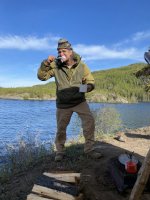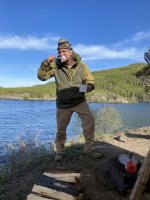Kathleen and I have done several northern Canadian canoe trips of four weeks. But our longest was 37 days on the Thelon River. We had planed 40 days, but arrived at Baker Lake at the head of Chesterfield Inlet on Hudson Bay three days early. We paddled alone, and saw only two other groups during those 37 days. I have never been happy to reach the end of a canoe trip. I have always wanted more. Below is from the end of our book about our trip in 1993. I think it expresses why we like wilderness canoeing. You can also view the trip report on page 2 of Canadian Trip Reports on this site.
It's good to be home, but I miss the river already. Despite being dominated by wind and water, we alone determined our daily activities. If the wind whipped up waves too high for paddling, we rested. If the river plunged through canyons or over ledges, we portaged. Other than for our self-imposed deadline of August 6 for reaching Baker Lake, time was interesting, but otherwise meaningless.
We had lived and travelled through an everlasting landscape. We had shared our journey with plants, birds, caribou, muskoxen, bears and wolves, all of us participating in the predictable progression of seasonal change. The concept of linear time, with beginning and end, is viewed by many native cultures as an artificial perspective. In reality, there is no beginning. There is no end. Seasonal cycles spin forever. As they always have. As they always will. Living within such cycles, time is irrelevant. Time can not be saved. Time can not be lost. Without a linear construct, time can not exist.
In Vancouver, time assumes nearly paramount importance. We arrived home on Wednesday evening, with four days to be ready for our commute beginning precisely at 7:06 on Monday morning. I spent Thursday and Friday tending to eight weeks of accumulated garden weeds and household chores. As I collected together the necessary gardening implements, I noticed a flat tire on the commuter car. No problem. I expected this, as the tire had been leaking slowly before we left. I wrestled the spare out of the trunk. It too was flat. Not too flat to drive, though. I inserted the key in the ignition. Click..click...click. Dead battery. A call to the BC Automobile Association instructed me to be ready in exactly 40 minutes.
Into the garden with hoe in hand. Ten minutes later Kathleen emerged from the laundry room with news that the dryer no longer produced heat. Back to the phone to contact the appliance store. The unseen voice told me they opened at 10:00, and might have replacement parts for our 20-year-old dryer.
On the river, all our equipment was functional and reliable, with virtually no moving parts. Self-sufficiency was blissfully easy. Alleged conveniences of civilization in Vancouver were frustratingly domineering by comparison. The phone rang demandingly. News of a house-warming party in the Fraser Valley. Drinks at 4:30 pm for dinner at 6:00.
The assembled guests expressed genuine interest in our Barren Grounds adventure. We basked in the 15 minutes of fame promised to all of us by Andy Warhol. Our fans ebbed and flowed during the evening, asking questions that invariably followed a predictable pattern.
"Did you see any bears?"
"Three."
"How close?"
"One was about from here to that far wall."
"Did you take a gun?"
"No, just cayenne pepper spray."
"Were the bugs bad?"
"They were horrible. Worse than I ever imagined they could be."
"How was the weather?"
"Variable. Wind -- particularly wind. Sun and rain. No snow, though. Our coldest temperature was 4 degrees C. (39 F).
"How long was the trip?"
"Five-and-one-half weeks; 950 km (590 miles). But it didn't really seem so long. You just live one day at a time no matter where you are. It's no different or longer than living in Vancouver for five-and-one-half weeks."
"Did you have an air drop for food?"
"No, Kathleen dehydrated all our food, which was excellent. We even have food left over."
"Did you have a radio?"
"No, but we did take an EPIRB for emergencies."
All very logical questions, but all of them totally missing the essence of wilderness canoeing. When my thoughts drift back to our quest, they settle comfortably on the multitudes of geese that gave us constant companionship. I can still see us drifting toward shore, anxiously surveying the bank for suitable camping sites. I can still see us eating bannock on a sunny morning, gazing restfully over a lake equally at rest. I can still see the orange-spotted white petals of prickly saxifrage, growing delicately among the riverside cobbles at the Mary Francis River. I can still taste the tart fruit of the blueberry, growing modestly in a tangle of lichens above Aleksektok Rapids. And, I can still remember lying in the tent pitched above Schultz Lake, listening to the hushed breath of absolute silence that reached out to us from beyond infinite, isolated tundra lakes and mountains.
More important than these images, however, is the enduring magic and memory of the nomadic experience of travelling through Canada’s pristine, northern landscape. It seems that none of our friends ever asks us the question most relevant to why Kathleen and I canoed alone 950 km across the Barren Grounds.
"How was the freedom?"
"Exquisite and absolute. It was as though we were the only two people in the world, travelling through a landscape so vast that it still functions as it has since the days it was first created.”
We can hardly wait to go again.


